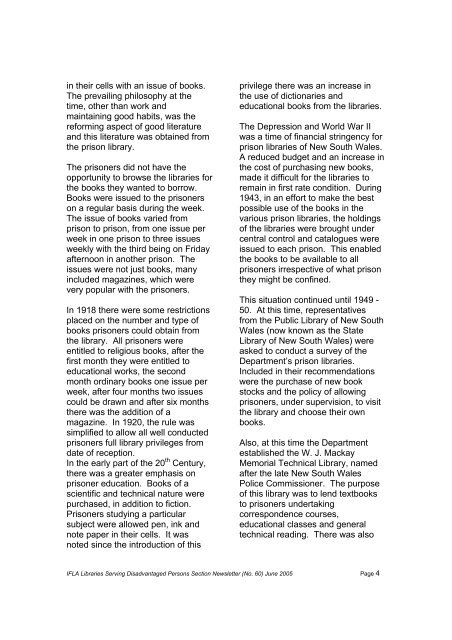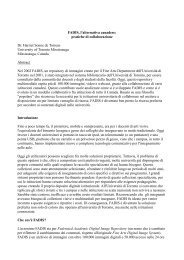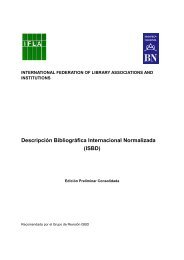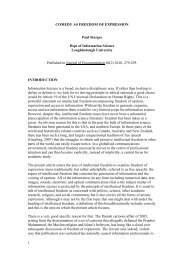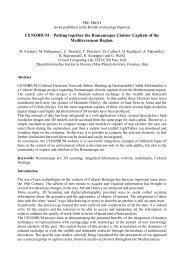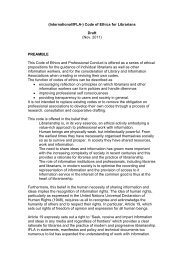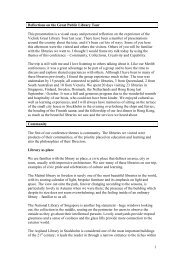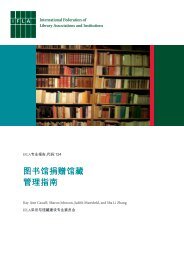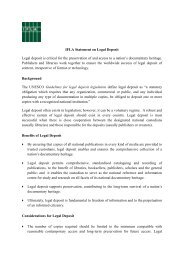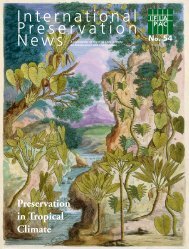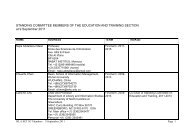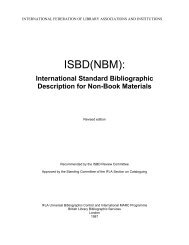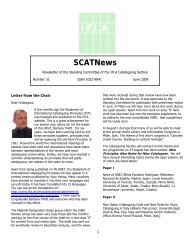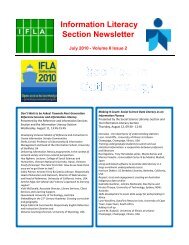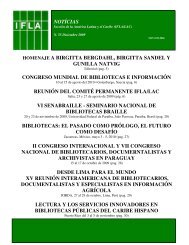IFLA Section Libraries Serving Disadvantaged Persons Section
IFLA Section Libraries Serving Disadvantaged Persons Section
IFLA Section Libraries Serving Disadvantaged Persons Section
Create successful ePaper yourself
Turn your PDF publications into a flip-book with our unique Google optimized e-Paper software.
in their cells with an issue of books.<br />
The prevailing philosophy at the<br />
time, other than work and<br />
maintaining good habits, was the<br />
reforming aspect of good literature<br />
and this literature was obtained from<br />
the prison library.<br />
The prisoners did not have the<br />
opportunity to browse the libraries for<br />
the books they wanted to borrow.<br />
Books were issued to the prisoners<br />
on a regular basis during the week.<br />
The issue of books varied from<br />
prison to prison, from one issue per<br />
week in one prison to three issues<br />
weekly with the third being on Friday<br />
afternoon in another prison. The<br />
issues were not just books, many<br />
included magazines, which were<br />
very popular with the prisoners.<br />
In 1918 there were some restrictions<br />
placed on the number and type of<br />
books prisoners could obtain from<br />
the library. All prisoners were<br />
entitled to religious books, after the<br />
first month they were entitled to<br />
educational works, the second<br />
month ordinary books one issue per<br />
week, after four months two issues<br />
could be drawn and after six months<br />
there was the addition of a<br />
magazine. In 1920, the rule was<br />
simplified to allow all well conducted<br />
prisoners full library privileges from<br />
date of reception.<br />
In the early part of the 20 th Century,<br />
there was a greater emphasis on<br />
prisoner education. Books of a<br />
scientific and technical nature were<br />
purchased, in addition to fiction.<br />
Prisoners studying a particular<br />
subject were allowed pen, ink and<br />
note paper in their cells. It was<br />
noted since the introduction of this<br />
privilege there was an increase in<br />
the use of dictionaries and<br />
educational books from the libraries.<br />
The Depression and World War II<br />
was a time of financial stringency for<br />
prison libraries of New South Wales.<br />
A reduced budget and an increase in<br />
the cost of purchasing new books,<br />
made it difficult for the libraries to<br />
remain in first rate condition. During<br />
1943, in an effort to make the best<br />
possible use of the books in the<br />
various prison libraries, the holdings<br />
of the libraries were brought under<br />
central control and catalogues were<br />
issued to each prison. This enabled<br />
the books to be available to all<br />
prisoners irrespective of what prison<br />
they might be confined.<br />
This situation continued until 1949 -<br />
50. At this time, representatives<br />
from the Public Library of New South<br />
Wales (now known as the State<br />
Library of New South Wales) were<br />
asked to conduct a survey of the<br />
Department’s prison libraries.<br />
Included in their recommendations<br />
were the purchase of new book<br />
stocks and the policy of allowing<br />
prisoners, under supervision, to visit<br />
the library and choose their own<br />
books.<br />
Also, at this time the Department<br />
established the W. J. Mackay<br />
Memorial Technical Library, named<br />
after the late New South Wales<br />
Police Commissioner. The purpose<br />
of this library was to lend textbooks<br />
to prisoners undertaking<br />
correspondence courses,<br />
educational classes and general<br />
technical reading. There was also<br />
<strong>IFLA</strong> <strong>Libraries</strong> <strong>Serving</strong> <strong>Disadvantaged</strong> <strong>Persons</strong> <strong>Section</strong> Newsletter (No. 60) June 2005 Page 4


